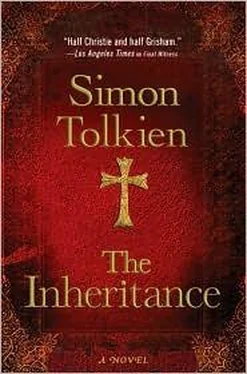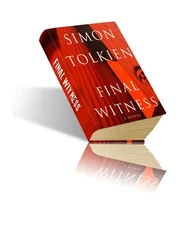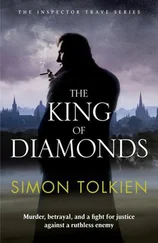Simon Tolkien - The Inheritance
Здесь есть возможность читать онлайн «Simon Tolkien - The Inheritance» — ознакомительный отрывок электронной книги совершенно бесплатно, а после прочтения отрывка купить полную версию. В некоторых случаях можно слушать аудио, скачать через торрент в формате fb2 и присутствует краткое содержание. Жанр: Полицейский детектив, на английском языке. Описание произведения, (предисловие) а так же отзывы посетителей доступны на портале библиотеки ЛибКат.
- Название:The Inheritance
- Автор:
- Жанр:
- Год:неизвестен
- ISBN:нет данных
- Рейтинг книги:4 / 5. Голосов: 1
-
Избранное:Добавить в избранное
- Отзывы:
-
Ваша оценка:
- 80
- 1
- 2
- 3
- 4
- 5
The Inheritance: краткое содержание, описание и аннотация
Предлагаем к чтению аннотацию, описание, краткое содержание или предисловие (зависит от того, что написал сам автор книги «The Inheritance»). Если вы не нашли необходимую информацию о книге — напишите в комментариях, мы постараемся отыскать её.
The Inheritance — читать онлайн ознакомительный отрывок
Ниже представлен текст книги, разбитый по страницам. Система сохранения места последней прочитанной страницы, позволяет с удобством читать онлайн бесплатно книгу «The Inheritance», без необходимости каждый раз заново искать на чём Вы остановились. Поставьте закладку, и сможете в любой момент перейти на страницу, на которой закончили чтение.
Интервал:
Закладка:
“Members of the jury, you are the only judges of the facts in this case,” he began, leaning back in his high-backed chair and allowing his eyes to travel up and down the jurors as if he was a general inspecting his troops before they went into battle. “The verdict is yours and yours alone. So you should ignore any comments that I make on the evidence if they do not assist you. Use them only if they help you. It is your opinion that matters, not mine.”
Swift could not help admiring the judge’s false modesty. He made the jurors listen to what he had to say by flattering their importance. He didn’t need to remind them that he had the experience of presiding over hundreds of the most serious criminal trials. He had seen it all before. It was their decision, but they would be fools to ignore the help that he had to offer them.
“So let us begin with the Crown’s case against this defendant,” said Murdoch. “Is it strong or is it weak? Has it been undermined by the defence? Remember, the Crown must make you sure of his guilt. Nothing less will do. Put another way, you must have gone beyond reasonable doubt. We can start with what is agreed. Stephen Cade and his father were estranged for the two years leading up to the murder. There is no dispute about that. The defendant has told you that he felt ashamed of his father and also harboured strong feelings of rejection. Whether he was right to do so is not what matters. You are concerned with his state of mind.
“At the end of this two-year period the defendant suddenly asks to see his father again. Why, members of the jury? I suggest that this is a vital question for you to answer. Was he concerned about his father’s failing health as he claims, or was he inflamed by the news brought by his brother, Silas, that he was about to be disinherited? Professor Cade was clearly a very rich man, and the defendant faced the loss of all his prospects at a stroke of his father’s pen.
“It is also apparent from the defendant’s evidence that this bombshell could not have come at a worse time. Young Mr. Cade had particular need of money last summer if he was going to keep his girlfriend, Miss Martin, from leaving Oxford. You will need to bear these matters in mind, members of the jury, when you come to decide what Stephen Cade’s intentions were when he sought a private interview with his father on the fateful night of the fifth of June. Was he quiet in his mind or had he had enough, as Mr. Thompson put it? And did his father’s insensitive behaviour with the chess pieces drive his son over the edge, or merely exasperate him to the point where he felt the need for a little evening air to cool his understandable annoyance?
“Nobody can read a man’s mind, members of the jury. Science cannot help you. No; what you must do is look at the evidence and use your common sense to draw inferences. There is quite enough material before you, I would suggest, to enable you to reach clear conclusions about what was in this defendant’s mind on the evening of the fifth of June, and those conclusions should help you decide what happened when Professor Cade won their rather one-sided game of chess.
“Remember that the defendant has admitted shouting at his father that he deserved to die. Was he referring to his belief that his father would soon be dead through natural causes, or was it at this point that he produced the murder weapon from his pocket? You must use you common sense to decide which explanation is correct. It is not for me to say. It is your verdict.
“And then there is the fingerprint evidence for you to consider. Of course Mr. Cade does not deny that he handled the gun and the key. He would be laughed out of court if he did. But he says that he did so innocently. Do you believe him, members of the jury? Would you pick up a gun at a murder scene, or would you leave it well alone, knowing that it would be vital evidence for the police to examine when they arrived? And what about the defendant’s hat and coat on the other side of the dead man’s body? Did he forget about them in his rush to get outside, or did he never go outside at all?
“The defendant says that someone must have come into the study and shot his father while he was out walking in the grounds. But who is this alternative assassin? Was it a passenger in the mysterious Mercedes that the defendant claims to have seen parked across from the gate on two occasions that evening? Certainly the first officers to arrive saw a car parked by the phone kiosk, and a Mercedes was stopped for speeding between Moreton and Oxford later that night. However, you must bear in mind that there was no breach of the manor’s security system that evening and that there is no one to corroborate the defendant’s account that the main gate was ever open. And if it was an intruder that killed Professor Cade, then what was his or her motive? It was clearly not robbery, for nothing appears to have been taken from the study, but what about revenge? It may well be that a man called James Carson hated the professor to the point that he tried to kill him in France in 1956, but this Carson was already dead by the time of the actual murder. He couldn’t have been the man in the Mercedes.
“I need to say a few words to you at this point about the evidence you have heard during this trial relating to a place called Marjean in northern France, where certain people died back in 1944. I allowed that evidence to go before you because I did not know at the time where it would lead. However it is now apparent that there is no connection whatsoever between the Marjean deaths and the murder of Professor Cade earlier this year, and in these circumstances I am issuing you with a formal instruction to set aside all the evidence relating to Marjean. It is irrelevant and cannot help you reach your verdict.
“So I go back to my earlier question. Who killed Professor Cade if it was not the defendant? Interestingly, the defence appears to have shifted its ground on this question during the course of the trial. At first its case appeared to be that it was an intruder, but now it points the finger at the defendant’s brother, Mr. Silas Cade. The defence relies on the evidence of Mrs. Ritter, who told you that she saw a figure wearing his hat and coat cross the courtyard beneath her window just before the shouting began down below. If true, this evidence clearly goes a long way toward exonerating the defendant. But is it true? Can you rely on Mrs. Ritter? Do not be swayed, members of the jury, by her unfortunate and untimely death. You must be objective. Remember what she said about Silas Cade. She felt betrayed by him, and it seems almost certain that she had only learnt of that betrayal minutes before she entered this courtroom to give evidence. Detective Clayton has told you about his ill-advised conversation with Mr. Blake in the cafeteria, and the way in which Mrs. Ritter ran from the room. It is not difficult to imagine her anger and distress, but did it lead her to lie?
“The question can be put another way. Was Silas Cade in the courtyard, or was he with Sasha Vigne in her bedroom? They both admit that they lied to the police, and Silas says that he lied to you when he first came here to give evidence. Perjury is a very serious offence not to be taken lightly, but both these witnesses have explained why they lied. Do you believe them? Again it is a matter for you, members of the jury. Silas told you that his fingerprints are not on the gun or the key. His brother’s are. And it was Stephen Cade who told their father that he deserved to die. You must decide who is telling the truth about this and the other questions that I have posed for you. And the answers should guide you down the road toward reaching a verdict on which all of you must be agreed. You shall have all the time you need for that purpose.”
Читать дальшеИнтервал:
Закладка:
Похожие книги на «The Inheritance»
Представляем Вашему вниманию похожие книги на «The Inheritance» списком для выбора. Мы отобрали схожую по названию и смыслу литературу в надежде предоставить читателям больше вариантов отыскать новые, интересные, ещё непрочитанные произведения.
Обсуждение, отзывы о книге «The Inheritance» и просто собственные мнения читателей. Оставьте ваши комментарии, напишите, что Вы думаете о произведении, его смысле или главных героях. Укажите что конкретно понравилось, а что нет, и почему Вы так считаете.












